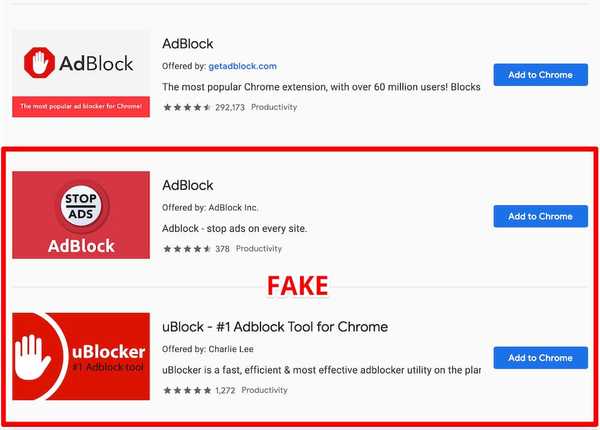Google Removes Two Popular AdBlockers From Chrome Web Store

Most of us use Ad block extensions for making the browsing experience better. And there is no doubt ad blockers are beneficial.
There are many extensions available on the market, and most of them are crap.
There are few trusted and popular ad blockers like Adblock and uBlock Origin. And I, myself is a massive fan of uBlock origin.
Read: 15 Best Android Launchers To Customize Your Smartphone
Due to their popularity, many other extensions trick users into downloading them by using names of popular adblockers.
Recently, AdGuard has revealed that two extensions AdBlock by AdBlock Inc and uBlock by Charlie Lee were using the names of other two very popular and legitimate ad blockers Adblock and uBlock Origin.
And the two fake and cloned extensions were engaged in malicious behavior.
They were the clones of legitimate adblocker, i.e., Adblock and uBlock Origin.
What's more surprising is that they have a fair share of users using these fraud extensions.
AdBlock by AdBlock, Inc had over 800,000 users, whereas uBlock by Charlie Lee had over 850,000 users.

And sites like Android Central had recommended AdBlock by AdBlock, Inc in the past.
And since AdGuard's report came out, Google has removed that two fake extensions from the Google Web Store.
Google removes two popular ad blocks extensions
What's Wrong With Them?
In their report, AdGuard also revealed that when being installed for about 55 hours, these extensions execute some commands in the background.
And according to AdGuard, at that instance, they were doing more than just adblocking.
These fake and cloned extensions then began to send out a request to urldata.net for each new visited domain.
And in response, the extension receives affiliate cookie. Now if the user purchases something, then the commission will be paid to the extension owner.
This technique is known as cookie stuffing.
Read: 10 Best Free Data Recovery Software
What is Cookie Stuffing?
Cookie stuffing, also known as Cookie dropping is an illegal ad fraud scheme.
In this technique, a website or a browser extension quietly adds affiliate cookies to the user browsing session to earn an affiliate commission.
Cookie stuffing happens without user's permission or knowledge.Moreover, they try to earn a commission from sales they had no role in and could potentially steal the commission of a genuine affiliate marketer.
Moreover, Adguard found out that these extensions were using some self-protection mechanisms.
Due to this, these extensions continuously detects if the developer console is open, and if it is, then these extensions cease all suspicious activity at once.
Final Words
The good news is that Google has removed these cloned extensions from the web store. And you should not install any extension without doing some research.
Read: 12 Best Free VPN For PC
Moreover, don't ever believe in the extension description; these descriptions can be fake.
If you are looking for a trusted and popular extension, you can follow the below links:
What do you think? Were you using the fraud extensions? Do let me know in the comment section.
